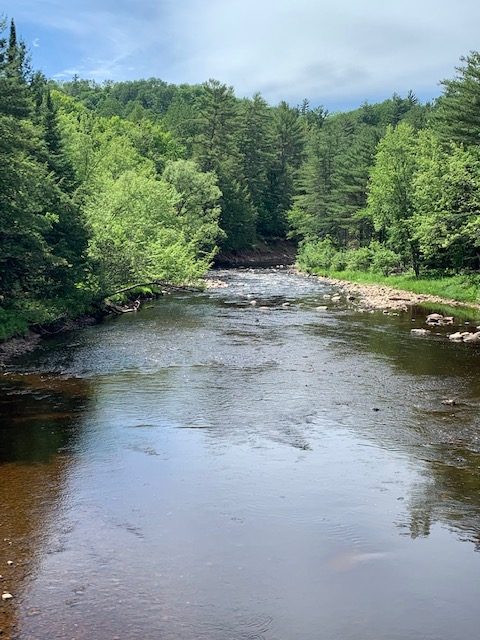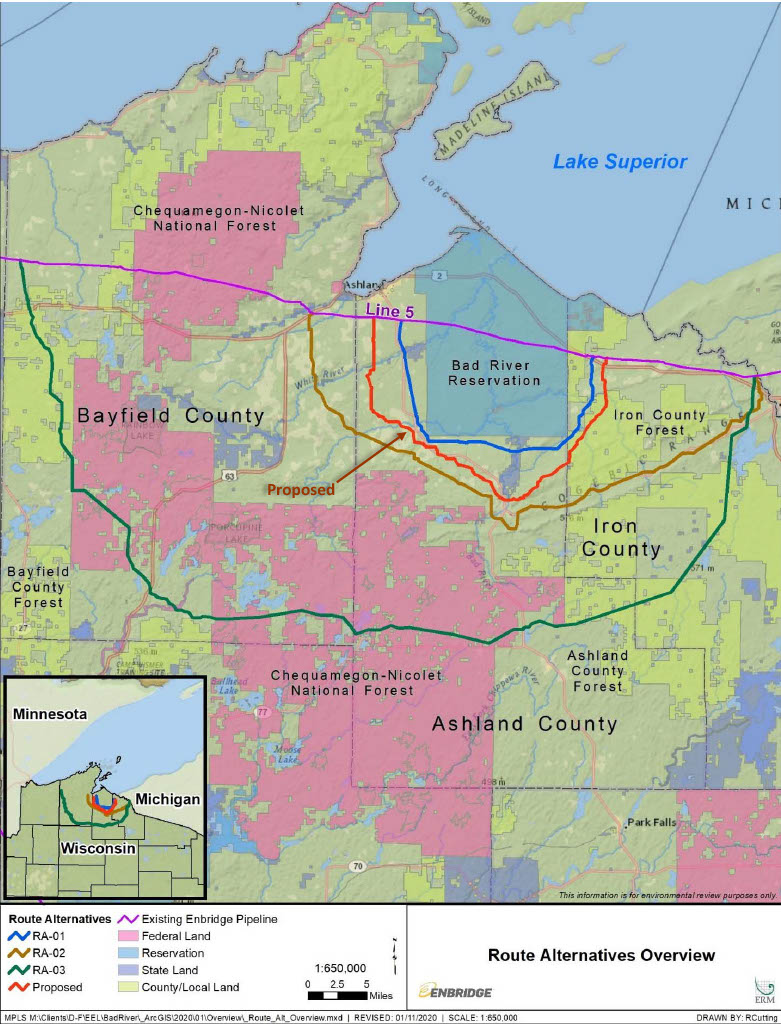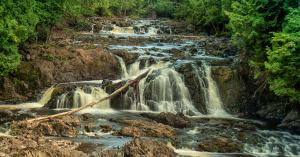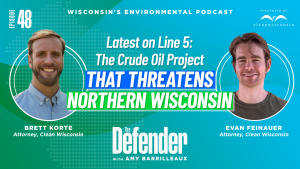Line 5: A Risk to Water, Wildlife, and Indigenous Rights
Construction of a new section of the Line 5 oil pipeline prolongs our dependence on harmful fossil fuels, threatens Treaty Rights, and puts some of Wisconsin’s most precious natural areas at risk.
Enbridge, a Calgary-based Canadian pipeline company, is trying to reroute 41 miles of pipeline after a federal court determined the pipeline has been operating in trespass on the Bad River Band of Lake Superior Chippewa’s reservation for over a decade. Enbridge’s subsidiary was granted permits from the Department of Natural Resources that allow the company to reroute Line 5 across dozens of northern Wisconsin waterways and more than 100 acres of wetlands. The proposed route is upstream of Copper Falls State Park and poses a huge risk to the Bad River watershed. Clean Wisconsin and our partners are challenging those permits in a legal proceeding known as a contested case hearing.
Protect Wisconsin’s water, climate, and tribal sovereignty. Line 5 is a threat we can’t afford to ignore.

Attending the Hearing
IN PERSON: Any member of the public may attend. Proceedings begin each day at 9:00 a.m.
VIRTUAL: The hearing may be observed by video and telephone via Microsoft Teams. To connect by video, use Teams on the web or the Teams app, then enter the Meeting ID: 247 227 844 895 and passcode: aK6Bt7Ye.
To connect by phone, dial 1-608-571-2209, and then enter the Meeting ID: 589 521 165# when prompted.
Testifying at the hearing
Public testimony may be given on August 12 in Ashland and on September 3 in Madison.
Members of the public who choose to testify must do so in person and are open to cross examination by Enbridge attorneys. If you wish to testify in either Ashland or Madison, you must register at the start of the hearing on August 12. You may register in person or using the Teams link above.
Take Action
Endangered Species Survey
Headed to northern Wisconsin? You can help document rare and sensitive species that could be harmed by the Line 5 tar sands oil pipeline. Follow the instructions on the protected species survey guide.

A Leaking Legacy with No Place in Our Future
Originally built in 1953, Line 5 carries nearly 23 million gallons of crude oil and liquid natural gas every day from Superior, Wis. to refineries in Ontario, Canada. Much of that oil originates in the Canadian Alberta tar sands region.
Line 5 currently runs across the reservation of the Bad River Band of Lake Superior Chippewa, but easements that allowed the company to use tribal land expired in 2013. The tribe has since filed a federal lawsuit to expel Enbridge from its reservation.
Enbridge is now pushing to build a new 41-mile section of pipeline that would be routed around the reservation. But moving the line doesn’t eliminate the enormous risk it carries.
Line 5 carries nearly 23 million gallons of crude oil and liquid natural gas across countless wetlands and waterways.
In the last 50 years, Line 5 has leaked 29 times, spilling more than a million gallons of crude oil into the environment.
Stay Informed With the Latest News & Insights
News & Insights

At the breaking point: The Line 5 contested case hearing
Podcasts & Videos

Latest on Line 5: The crude oil project that threatens northern WI
“What Line 5 means for me…”
Join Ojibwe attorney Philomena Kebec as she harvests wild rice in the Kakagon Sloughs, the largest undeveloped wetland system on the Great Lakes.
Frequently Asked Questions
Why is Line 5 so dangerous?
It’s a 70-year-old pipeline prone to leaks, crossing sensitive wetlands and waterways with outdated infrastructure.
Why oppose the reroute?
Moving the pipeline still threatens clean water, wildlife habitat, and violates the spirit of Tribal sovereignty. It doesn’t solve the problem — it just shifts the damage.
Who else is fighting Line 5?
Clean Wisconsin is working alongside the Bad River Band, Sierra Club, Midwest Environmental Advocates, Earthjustice, and many other partners to stop this project at every stage.
What is a contested case hearing?
A formal legal proceeding in which an administrative law judge reviews evidence and testimony to determine whether a state agency, in this case, the Wisconsin DNR, properly followed state laws when issuing permits.
